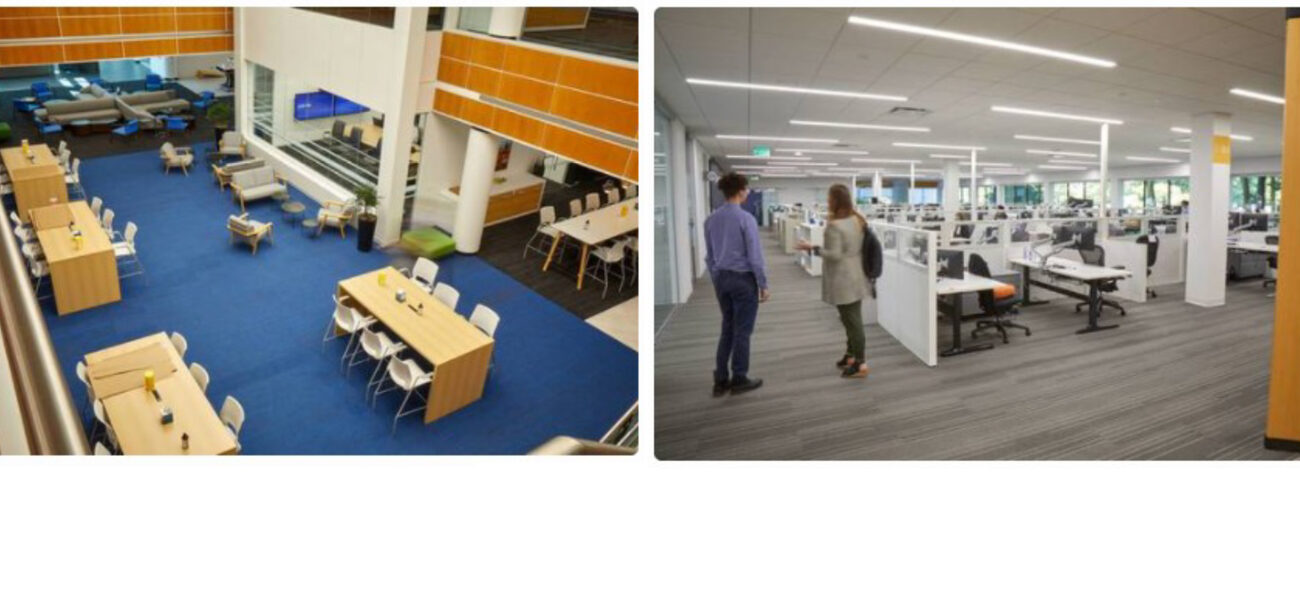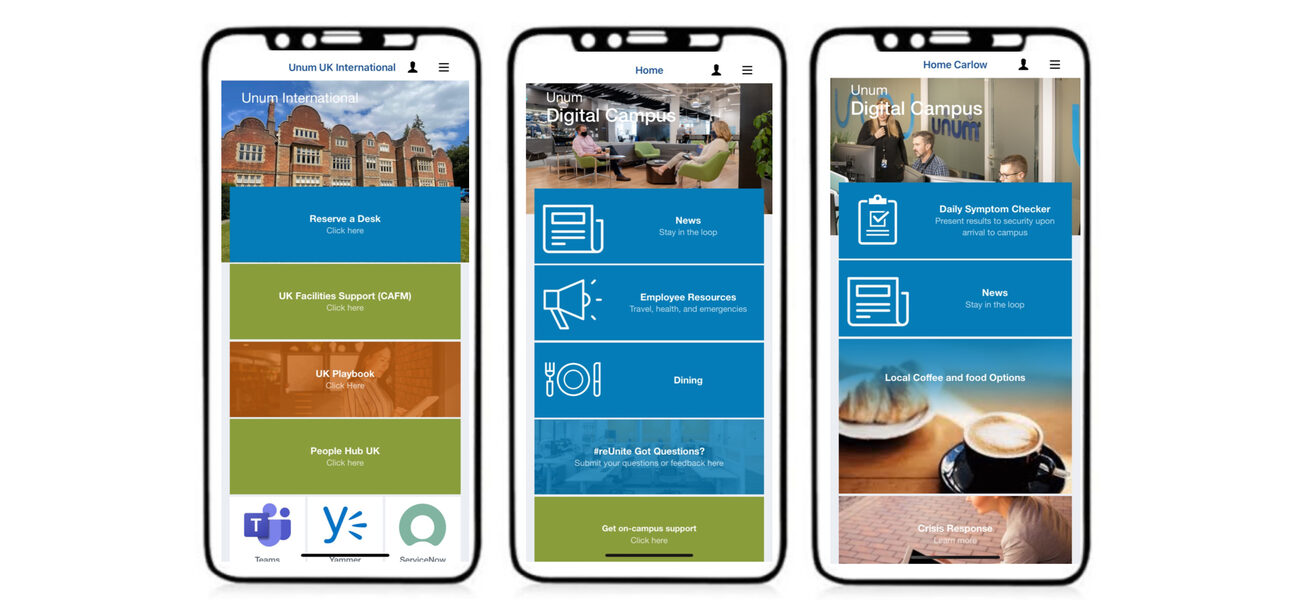Even before the COVID pandemic, many companies were looking to optimize space and decrease costs. Unum Group, an insurer with international operations, has taken a multi-pronged approach: reducing its on-campus footprint by creating one-size-fits-all work spaces, moving to flex-for-all seating, switching nearly half of its long-term off-campus leases to coworking rentals, and developing a Modo® Labs app for space utilization and company communication. The app offers real-time access to concierge services, online food ordering, and organizational information. In the United Kingdom, employees can also use the app to make seat reservations and ensure they have a desk when coming to the office.
Unum Group has 10,000 employees and 3.5 million sf of office space across 33 U.S. states, the U.K., Ireland, and Poland. In addition to owned buildings on various campuses, the company also maintained 103 leases in U.S. field locations. Over recent years, it has reduced the number of long-term leases by almost 50 percent and moved to yearly coworking spaces, renting 12-person suites where teams can work together. Coworking offers greater flexibility through shorter lease times, as well as cost savings, because leases include furniture, internet access, coffee and bottled water, and sometimes utilities.
In March 2020, Unum completed a renovation and reorganization of its three campuses in Tennessee, Maine, and South Carolina. By removing differently sized offices and replacing all workspaces with universal seating, the company reduced its footprint by 18.5 percent and found it needed less space to fit its employees. It then converted the remaining empty buildings to tenant-friendly spaces that it leases to other businesses.
“Footprint reduction mostly comes about through consolidation and efficiency,” says Paul Larkins, RA, CFM, MCR.w, CCIM, Unum’s AVP of Real Estate Strategy and Projects. “We stripped hierarchy out of the equation, so being a vice president doesn’t get you an office or bigger cube. We now have a one-size-fits-all solution, with everyone having the same space.”
Each universal workstation includes a 6-by-6-foot sit-stand desk with universal docking station, sit-stand electronic desk, two or three external monitors on adjustable arms, and an Aeron chair. The company provides ergonomic assessments, and details are stored in user profiles that employees can access to configure their space—for instance, if someone forgets their optimal desk height, they can look up the information online.
Managing the Details
The company also reduced some of the more time-consuming and costly parts of standard office life:
Migrating to digital mail. Unum got rid of all paper mail, which eliminated the need for mail centers. Now, everything is scanned and then emailed to the recipient.
Switching from nighttime to daytime cleaning. Because the office is never at 100 percent capacity, cleaners can complete their work during the day with the benefit of being visible, reducing the need for 24-hour building access.
Moving to a Wi-Fi-only environment. During the renovation, all ethernet cables were removed. All employees now connect directly to company Wi-Fi, which eliminates the need for installing and managing cables and also provides less interruption when an employee moves their laptop from a workstation to a café or meeting room.
Eliminating landlines and company cell phones. Company phone numbers are run through Cisco Jabber and Microsoft Teams, and targeted employees receive a monthly stipend that is applied directly to their personal mobile account.
After the renovation, Unum also shifted from assigned offices and workspaces to fully flex seating. Teams are assigned neighborhoods only—a collection of workspaces within a building that a team can use as it likes—but no one is assigned a specific space unless medically designated.
“What happens within the neighborhood stays there,” says Larkins. “If you want to get together and choose seats, that’s fine. But we will not track that information centrally.”
Hybrid Work Environment
Of course, the pandemic showed companies that almost everyone can work from home. In 2019, 13 percent of Unum’s workforce was fully remote. Now it’s about 33 percent. Looking forward, the company is creating hybrid work requirements that will likely see people in the office two or three days each week but expects few if any employees to come in every day. A recent badging-out process not only alerts whether people are in the building—such as during an emergency that requires evacuation—but also provides information the company can use to make future space decisions: Do employees stop in for an hour to pick up supplies or attend a meeting, or do they stay for a full workday?
An important component in Unum’s workplace strategy is its new work experience app powered by Modo Labs, an app developer that focuses on campus environments. The app has both mobile and web versions and offers a self-service one-stop shop through which employees can order food, access campus concierge services, read company news, get facilities support, and more. Because Unum didn’t require much customization, it got the app up and running in about six weeks.
Larkins is the app’s internal owner, which keeps control centralized. An administration panel allows for alterations as needed, with no need to contact Modo Labs; Unum project managers on Larkins’ team can easily update and push information to all users. Internal company communications can be easily shared and show up in users’ notifications. Emergency information, such as a fire or bomb threat, gets shared as a banner notice on users’ main phone screens even if the app is not open. The app is configured for different sites, with localized news and campus details.
“We can stand up eight different locations, however we want to define them,” says Larkins. “Each has its own splash page, and the app brings up the right location based on an employee’s credentials.”
In the U.K., a key app feature is the mobile seat reservation tool. Employees can reserve a workstation up to seven days in advance for all or part of the day. They select which building and floor they’d like and can see a floor plan of available seats for their desired timeframe. They can also choose various features, such as desk height and number of monitors, and then receive reminder notices the night before and one hour before their reservation begins. Because each campus building has a geofence with a 1,000-foot perimeter, employees can’t check into their space until they (and their phone) reach the location. If someone fails to show an hour after their reservation begins, that seat is released for others to use.
Larkins and his team plan to roll out seat reservations in other locations soon, along with a “friends and family” option that lets people see when their colleagues will be in the office and allow for concentrated collaboration and encouraging networking. Teams can then easily schedule in-person days together for joint work projects or to catch up and have some in-person camaraderie.
Unum rolled out the app around the same time the pandemic hit full force. When restrictions eased and people returned from remote work, they had to fill out a symptom checker on the app before being allowed to enter campus buildings. One upside to this is that users had to become acquainted with the app. Now that symptom checker is no longer required, Larkins notes it can be more challenging to get employees to open the app regularly.
“We want them engaged every day, wherever employees may be working, but we’re not there yet,” he says.
By Amy Souza

